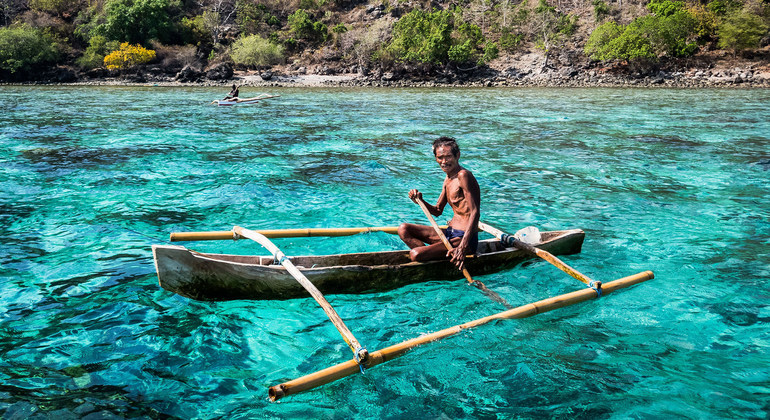Peter Thomson, who hails from the Pacific Ocean island of Fiji, spoke to UN News ahead of World Oceans Day marked annually on 8 June, and explained why it’s crucial not to forget how important the Ocean is, to the future of the planet.
Where are we right now in terms of the physical health of the Ocean?
The Ocean is in trouble. Some 60 per cent of the world’s major marine ecosystems have been degraded or are being used unsustainably. We know that the Ocean is getting warmer, that it is losing oxygen and becoming more acidic. These changes, driven by anthropogenic greenhouse gas emissions, are incrementally making life underwater more difficult, with big implications for life on land.
Deep cuts in our greenhouse gas emissions are required if we want to reverse the declining health of the Ocean.
As we approach the massive task of socio-economic recovery from the coronavirus pandemic, the self-interest of our species lies in investing public funds into a future of sustainable projects that help the environment and the climate.
Why should we care so much about the Ocean?
Billions of people depend on the Ocean for their main source of protein and millions of others draw their livelihood from the seas. It’s estimated that marine fisheries provide 57 million jobs globally.
Covering 70 per cent of the earth’s surface, absorbing 25 per cent of all carbon dioxide CO2 emissions and 90 per cent of the heat generated by our greenhouse gas emissions, the Ocean is the planet’s largest biosphere and climate regulator.
It generates 50 per cent of the oxygen we breathe and is often described as the lungs of this planet. It is also the planet’s largest carbon sink, making it one of our greatest allies as we face the challenges of global warming.
But the Ocean’s resistance and resilience are not infinite, and we cannot expect it to endlessly absorb the effects of unsustainable human activities.
It is said that trouble for the Ocean means trouble for the people, for we cannot have a healthy planetary ecosystem without having a healthy Ocean.
To what extent do you see the current COVID-19 crisis as a way to provoke a rethink of the way humankind treats the Ocean?
In this respect I urge you to think about the six principles that UN Secretary-General Guterres laid down in his Earth Day address this year, principles that included ending fossil fuel subsidies, polluters being made to pay for their pollution, and investing public funds into a future of sustainable projects that help the environment and the climate.
The future of human health, of sustainable food and socio-economic systems, of renewable energy and of a stable climate relies on a healthy Ocean. Therefore, I trust that the tragedies suffered through the COVID-19 crisis will not be repeated by returning to the planet-polluting policies that preceded the pandemic. The best interests of our countries and communities lie in investing in the clean, green transition.
At this time, decisions on massive financial commitments are in train, and before the seal is set upon them, we should ensure the consequences of taking the low road back to the polluting fossil-fuel dependant world we knew,
are understood and avoided. Governments, development banks, agencies, corporations, none should allow themselves to avoid long-term responsibilities in the name of short-term expedience.
Humankind will continue to rely on the Ocean for a wide variety of resources, but can this reliance be more sustainable?
It absolutely can, as long as we take the approach of blue-green recovery and give the Ocean the respect it deserves. This approach is all about getting the balance right between protection and production.
The Ocean will provide us with the future we want, be it through better medicines, nutrition, or sources of renewable energy. Sustainable fisheries and aquaculture, marine biotechnologies, ecotourism, the greening of the global shipping fleet and more, these will give us the resilience and sustainability we seek.
A sustainable ‘blue economy’ which takes into account the well-being of our Ocean will give us a healthy future, but only if we first correct our bad habits on land.
How does that look on a small island developing state?
Small Island Developing States (SIDS) are particularly vulnerable to global economic shocks and they are in need of special assistance at this time.
Many of these countries are highly dependent on tourism for foreign exchange earnings and employment. As lockdown measures ease, urgent attention is required to restore travel connections between compatible countries in order to allow some resumption of tourism. The same relaxation is required for trade and services between compatible countries.
How optimistic are you about the Ocean in the light of the coronavirus pandemic?
I try to be neither optimistic nor pessimistic, but instead concentrate on the dogged pragmatism required for us to implement our internationally agreed goals.
A 2018 report on global warming by the Intergovernmental Panel on Climate Change told us that limiting global warming to sustainable levels would require rapid, far-reaching and unprecedented changes in all aspects of society. While life-altering pandemics are not the prescription for mitigation of climate change, the COVID-19 crisis has demonstrated possibilities for unprecedented change.
Perhaps the greatest risk of the pandemic would be that we lose sight of the most fundamental challenge facing humanity, which is the effect that climate change is having on our planet, now and in the future.





